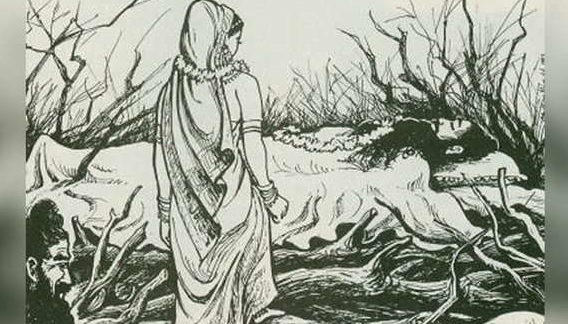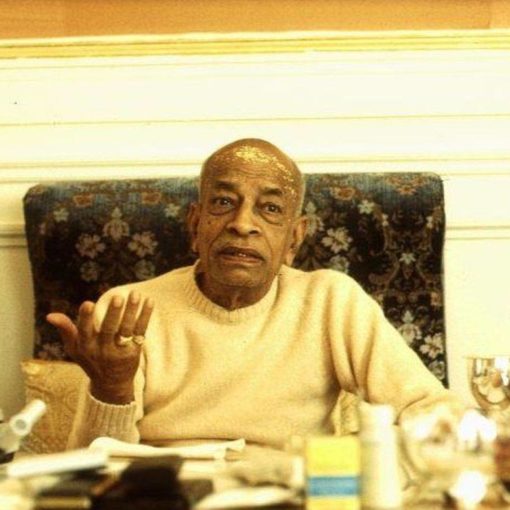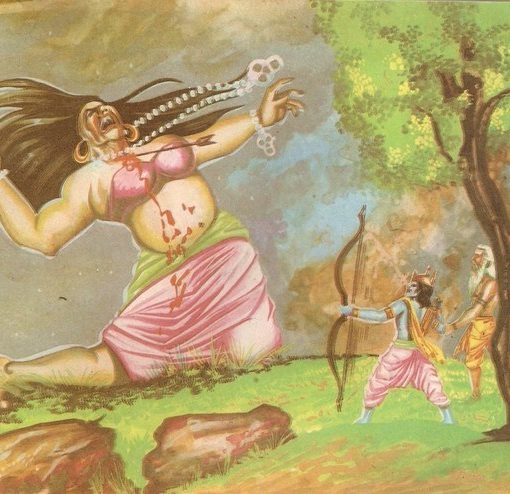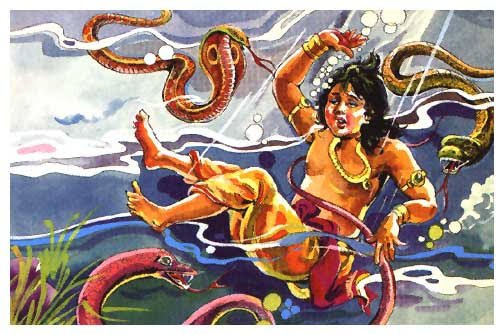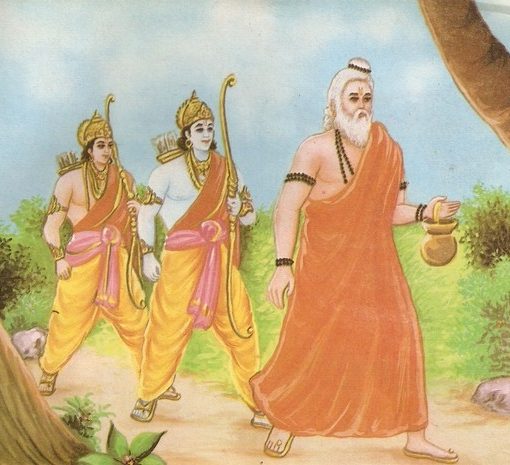As Pāṇḍu’s body fell from hers, Mādrī let out a wail of sorrow. Her worst fears had been realized. Despite all her protests she had not been able to prevent her husband’s death. The distraught queen repeatedly embraced her dead husband and lamented loudly.
Kuntī heard Mādrī’s cries and ran over to where she lay. As Kuntī approached, the tearful Mādrī told her to come alone, without children. Kuntī quickly sent the boys back to the ashram, then rushed to Pāṇḍu’s side. She dropped to the ground. Kuntī realized at once what had happened, and she cried out, “My lord!” Tears welled into her eyes as she turned to Mādrī. “O noble one, how have you allowed this to happen? I was always so careful to protect our lord from this very danger. How did he embrace you, knowing of the ṛṣi’s curse? Why did you tempt him when you were alone together? He was always grave in our company as he thought of Kindama’s words. How did he become so careless?”
Mādrī wept, unable to reply. Kuntī tossed about on the ground next to her. The two beautiful ladies embraced their husband’s dead body and shed profuse tears. Kuntī again addressed Mādrī. “O princess of Madra, you are surely more fortunate than I, for you saw our lord’s face light up with joy as he approached you in this lonely place.”
Gathering her senses, Mādrī replied, “O sister, with tears in my eyes I tried to resist him, yet he could not control himself. He seemed bent on fulfilling the ṛṣi’s curse.”
Kuntī prayed for strength. Somehow this was God’s arrangement. The ways of Providence were always mysterious. But what should be done now? What was her duty? She gently stroked the head of her younger co-wife and said, “O Mādrī, there is only one recourse for me. Please allow me to ascend to heaven with our lord. Rise up and raise our children. Give me the body and, tightly embracing it, I shall enter fire.”
Mādrī shook her head. She pleaded with Kuntī, “The monarch died as he approached me for intercourse. His desire was not satiated. Should it not be I who goes to the region of the dead to gratify him? I am still clasping him even now and will not allow him to go without me. O Kuntī, please let me go!”
Mādrī felt incapable of bringing up the children by herself. Kuntī would be a far better mother. Mādrī had seen her gentle dealings with the boys. She would surely treat them all equally. Mādrī begged Kuntī’s permission to enter the fire with Pāṇḍu. “O Kuntī, the king sought me with desire. Grant me leave to fulfill that desire. You would be doing me the greatest good. I shall leave my sons in your care without any fear.”
Kuntī looked compassionately upon Mādrī as she lay with her arms around Pāṇḍu and bathing him with her tears. The noble Kuntī felt her heart torn. Although as the elder wife it was her privilege to choose to follow the king to the next world, how could she deny Mādrī? It was to her that Pāṇḍu had been attracted. If Mādrī were to live, she would live with the memory of that brief and terrible moment all her life. Guilt would consume her, along with the anguish of being unable to fulfill her lord’s last desire. Although she longed to follow her husband, Kuntī could not be so cruel to her co-wife. She touched Mādrī gently and said, “So be it.” Kuntī then went with a heavy heart toward the ashram.
When the boys heard of their father’s death they were struck with grief. They ran crying to where he lay and fell to the ground, like powerful lions rolling on the earth. Mādrī blessed them tearfully and told them that she would be ascending the pyre with her husband. She asked her two sons to remain with Kuntī and to serve her steadfastly. The boys were too shocked to reply. They watched as the ṛṣis built a pyre next to the king’s body, then, while reciting mantras, placed his body upon the pyre. They asked Yudhiṣṭhira to step forward. The prince, blinded by tears, set fire to the pyre and stood back. As the flames rose, Mādrī folded her palms and fell upon her lord’s body, holding tight as the fire consumed them both. Within minutes both she and Pāṇḍu were gone.
The griefstricken Kuntī then asked the ṛṣis what she could do. The ṛṣis advised Kuntī to return to Hastināpura with her boys as soon as possible. They also told her they would accompany her, carrying the remains of Pāṇḍu and Mādrī with them
The large number of ṛṣis, Siddhas and Cāraṇas formed a procession, walking ahead of Kuntī and her sons. By their mystical powers, they all arrived at Hastināpura within a short time. Kuntī then presented herself at the northern gate and messengers ran swiftly to inform the king.
Upon hearing of her arrival, Dhṛtarāṣṭra, Bhīṣma, Satyavatī and all the other Kuru elders hurried to the gate, followed by a large number of citizens, who had heard that an assembly of celestials had arrived. Everyone was struck with wonder to see the brilliant ṛṣis surrounded by Siddhas and Cāraṇas. People came out in the thousands to see those divine beings.
The Kurus were distracted with grief over Pāṇḍu’s loss. Pāṇḍu had been dearly loved by all the citizens and they loudly lamented. Pāṇḍu’s five sons, known as the Pāṇḍavas, lay on the bare ground for twelve days, giving full vent to their grief. They did not accept royal comforts or beds, and they wept along with the Kuru elders.
At the end of the mourning period, the Kurus performed Pāṇḍu’s śraddhā. They distributed vast amounts of food and wealth to the Brahmins on behalf of the departed souls. Then life returned to normal in Hastināpura and Pāṇḍu’s sons took their place in the royal family.
It was at that time that Vyasa chose to again appear in the city. He spoke privately to the bereaved and sorrowful Satyavatī. “O Mother, fearful and terrible times lie ahead. The dark age of Kali now approaches. Sin increases day by day. Soon, by the evil acts of the Kurus, your race will be destroyed and a great havoc will be wrought in the world.”
Vyasa advised his mother to immediately retire to the forest rather than staying to witness the pain and horror that would soon follow. She should devote herself to yoga practice and meditation.
After Vyasa left, Satyavatī reflected on his words. She decided to follow his advice. She then told her two daughters-in-law of her intentions, and asked Pāṇḍu’s distraught mother, Ambālikā, to accompany her. The two royal ladies soon left for the forest to dedicate themselves to asceticism. In time they gave up their bodies and went joyfully to the higher regions. Ambikā remained at Hastināpura with her son, Dhṛtarāṣṭra.
Reference: Mahabharat Retold – Krishna Dharma Das https://www.vedabase.com/en/mbk/1/3

